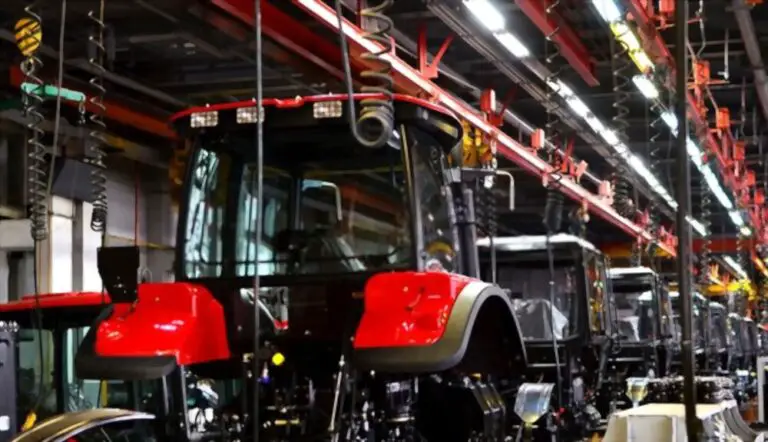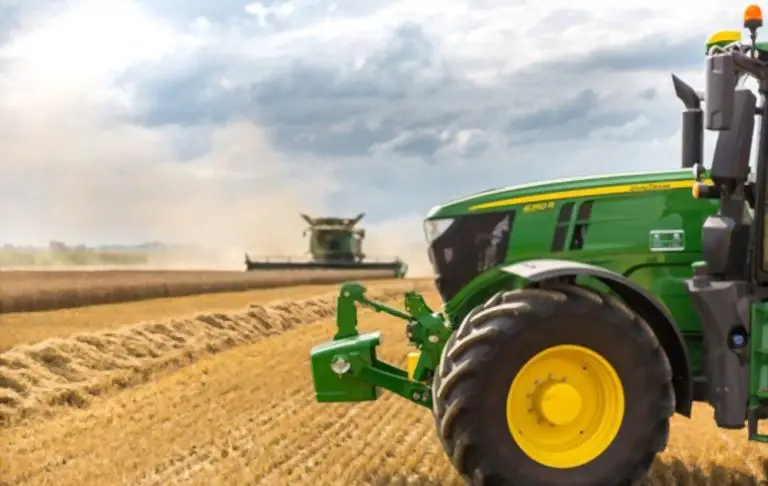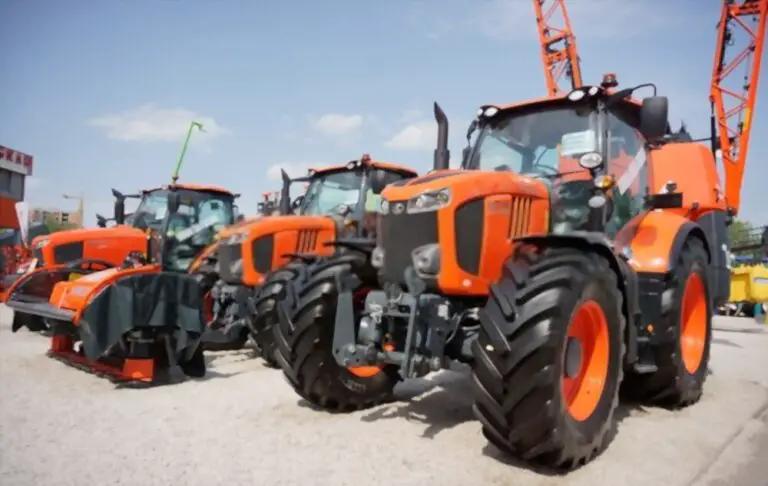How Much Do Tractor Tires Cost? Tractor tires are the key parts of tractors that keep them moving or functioning. A Tractor cannot function without tires and won’t be complete as a tractor.
Often tractor owners are disturbed about the best tractor tires to get. There is usually contemplation between buying new or used tires and which is better and more cost-effective. In addition, to being one of the key parts of a tractor, it is one of the most expensive parts to fix.
Here I will show you how much tractor tires cost, the different types of tires, how to maintain your tractor tires, and everything you need to know about tractor tires.
How Much Do Tractor Tires Cost?
Buying a tractor tire will cost you a fortune. You can get a radical design tractor tire from Titan Tire Corporation at a retail price of $1,600 to $2,900. Also, you can get some brands of new tires as low as $400, and this price is still expensive for many.
However, you can settle for used tires, as they are far cheaper than their counterparts, but you have to be careful not to buy a damaged tire or one that will stress you out.
Types of Tractors Tires
There are three types of tractor tires in the market. They are:
- Agricultural Tractor Tires (R1)
- Turf Tractor Tires (R3)
- Industrial Tractor Tires (R4)

Agricultural Tractor Tires (R1)
Investing in agricultural tractor tires will be best if you use your tractor mainly for fieldwork. These tires offer the highest traction among all the other two tractor tires.
This tractor tire is important has it aids the forward motion of the tractor on muddy terrain surfaces and various field conditions. This tractor tire has a special tread design that makes it the most torque, empowering the tires to move and function easily in all field conditions.
The tractor tire features an aggressive tread pattern that ensures a better off-road performance, but the limitation here is that it can damage the field and leaves an imprint on the terrain surface, which is not nice. As such, the agricultural tire is not suitable for turf usage.
Turf Tractors Tires (R3)
Turf Tractors Tires are specifically designed for golf carts and lawnmowers. As the name depicts, this tire is meant to be driven functionally without harming the turf surface.
The tires feature a lug placement of the optimal tread, enabling traction on the grass field without leaving any imprints. As such, the grass is not damaged during the process. Turf tractor tires offer the lowest traction among the other tractor tires and are less aggressive than both.
Using Turf tractor tires only during the dry season would be best. This is because their capability is reduced in wet weather. Once the turf or road surface becomes slippery or swampy, the tire loses its gripping capability and traction.
Industrial Tractor Tires (R4)
Industrial tractor tires are designed to be used on construction sites (especially on forklifts). Like the Turf tractor tires, the Industrial tractor tires offer good traction in dry weather.
Industrial tractor tires are made from a strong rubber material that provides a tougher resistance against wear when driven on gravel roads, concrete, and asphalt. The semi-aggressive design of the industrial tractor tires helps to ensure greater grip when the tire is functional.
Also, its load durability is upgraded due to its aggressiveness and toughness. They can easily carry and withstand heavy loads, making them the best tractor tires for heavy-duty work.
Maintenance Tips for Tractor Tires
Tractors are more expensive to maintain than normal automobiles such as cars and vans because they are heavy-duty vehicles used for more complex work, and the tires are one of the most expensive parts. As such, learning how to take care of your tractor is necessary.
Below are the tractor maintenance tips and instructions to prolong your tire’s life.
- Read and understand your tractor’s manual: The first thing you do when you purchase your tractor is to calm down and read and understand the manual. This will help you know the tractor’s dos and don’ts, including the tires. Manuals contain the manufacturer’s advice on how to use the tractors effectively and guidelines on troubleshooting frequent problems.
- Understand your tire specification: Tractors differ in the specification, and each specification has functions and problems. You have to read and understand the specification of your tractor in terms of diameter, model number, size, height, width, and the recommended tire pressure and weight. This helps you to understand the functioning of your tire, as well as the unique care it needs.
- Regular checks on the tire pressure: When you use your tractor tires frequently, the air pressure decreases, which increases the occurrences of wear and tears, which can cause damage to the tractor tire. Tractor tires have a recommended air pressure they must maintain, and you can find that in the manual. Checking your tire air pressure regularly will help you to regulate it, which is essential for the improved functionality of your tire.
- Avoid overloading your tractor: Each tire has a specified load capacity. So to prolong the life of your tire, please void carrying overload, as it increases the chances of wear and tear on the tires.
- Get the necessary tools: Tractors require larger wrenches and other necessary tools than cars and vans. While taking care of your tires, you must invest in getting the proper tools.
- Regularly cleaning your tractors, including the tires: You must regularly clean them, as it helps spot leaks and damages faster before they worsen. However, some tires have the self-cleaning ability, but the tread depths usually determine this.
How do you know if your tractor tires need to be replaced?
This is one of the most frequent questions most tractor owners ask. On an average scale, tractor tires have a lifespan of three to six years. So you are expected to replace your tractor tires at the end of every 3 to 6 years.

These days, most tractor tires come with slip indicators. When slips increase, it is a sign that the tires need to be replaced. You may have to check the degree and how far the tractor tire lugs push the dirt backward for older tires.
Other signs that indicate that it is time to replace your tractor tires are:
- Cracks as a result of dryness
- Consistent wear and tears
- Bulges on the tire surface
- Deflated tire
Cracks due to dryness: It is not unusual for tire materials to dry up. As they grow older, they dry up, and this causes cracks to appear. These cracks deteriorate the tire causing it to lose its flexibility. When the cracks become consistent and are not attended to, they may cause the tire tread to separate.
Consistent wear and tears: When a tire is constantly used, the air pressure decreases, and this may cause wear and tear on the tires. The wear may be one-shoulder wear- when the tire is tilted to one side, disseminating more pressure on one of the shoulders, or maybe two-shoulder wear.
Bulges on the tire surface: If your tractor tires have bulges or cuts, you must attend to them urgently, as it may lead to bigger damage that can destroy your tire. Also, you must pay attention to the roads, as bad roads are the major causing factor of bulges on the tire surface.
Deflated tire: A lack of air pressure can cause a tire to deflate, and once the tire is deflated, the sidewall of the tire becomes susceptible to damage.
Is Buying used tractor tires good?
Buying used tractor tires isn’t bad because new ones cost a fortune. You often have to break the bank to acquire a new tractor tire.
So buying a used tractor tire will save you money and the stress of looking for financing. You can get a used tractor tire as low as $50. However, the prices of used tractor tires vary and depend on the durability, how well the tractor tire is preserved, and the strength of the tire.
When buying a used tractor tire, you have to apply caution. Examine the tractor thoroughly before paying for it. Ensure the tire does not have plenty of bandages and can serve you for a long time. There is one good thing about tractors. It is that you can even sell your damaged tractor tire. Sounds interesting, right?
Even if your tractor tire is damaged, you can still find interested buyers to purchase them. These buyers recycle old tractor tires into gym, farm, or playground equipment. The basic truth here is that even your damaged tractor tire is valued.
What’s inside a Tractor Tire?
Most people think a Tractor tire is just a round piece of inflated rubber and nothing else. However, a tractor tire is more complex than this. Heavy-weight parts require a great deal of weight and pressure, and just an empty inflated rubber won’t do justice.
A tractor tire is made up of three parts, and they are:
- Belted bias: A belted bias tractor tire features a crisscrossing layer of rubber plies overlapping each other. Also, the belted bias tractor tire consists of a corded belt attached under the tread. The belts are arranged at differing angles in the tire, enhancing the tire’s performance and providing a comfortable ride, even at higher speeds with lesser rolling resistance.
- Bias: A bias tractor tire features several rubber plies intersecting each other, creating a thicker layer, thus making it flexible. The crown and sidewalls are interdependent. A bias tractor tire is more flexible than the others, giving it a comfortable and smoother ride even on rough terrains. However, bias tractor tires are sensitive to overheating, have less traction, and are harder to control at high speeds, like belted tires.
- Radial: A radial tractor tire uses cords spanning from the beads and across the tread at right angles to the center of the tread, unlike belted and bias tractor tires. Here the cords are not crisscrossed, they are parallel, and the stabilizer belts are placed beneath the tread. Radical tractor tires help to give greater control and lowered resistance to trucks or tractors when driven at high speeds. However, the tire doesn’t possess a self-cleaning ability.
How long do Tractor Tires last?
The average life of a tractor ranges from 3 to 6 years. You should never keep your tractor tires to exceed six years, even if they remain in good condition.
You must consider that a tractor tire over six years is termed to have fulfilled its lifespan and is very susceptible to injuries, wear, and tears that can affect the overall productivity of the vehicle.
The tractor tire is a very important part of the tractor. A tractor isn’t complete without tires and can never function without tires, and you must invest in quality tires.
Ensure you take cognizance of the maintenance tips above to keep your tire in good condition.






